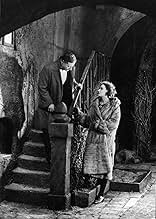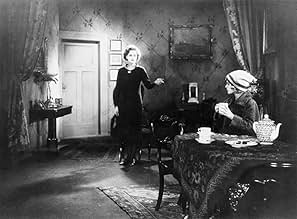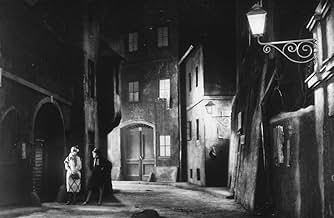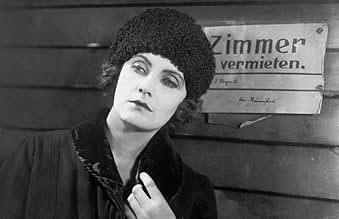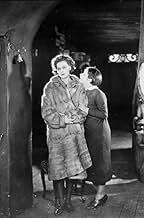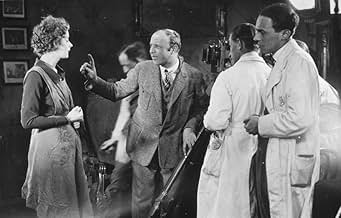IMDb RATING
7.0/10
1.8K
YOUR RATING
In post-WWI Vienna, Greta (Greta Garbo), her kid sister, and retired dad try to make it through tough times.In post-WWI Vienna, Greta (Greta Garbo), her kid sister, and retired dad try to make it through tough times.In post-WWI Vienna, Greta (Greta Garbo), her kid sister, and retired dad try to make it through tough times.
- Director
- Writers
- Stars
Ágnes Eszterházy
- Regina Rosenow
- (as Agnes Esterhazy)
Dorothea Thiele
- Lia Leid
- (as Tamara)
Renate Brausewetter
- Frau
- (uncredited)
Mario Cusmich
- Oberst Irving
- (uncredited)
Maria Forescu
- Frau
- (uncredited)
Robert Garrison
- Don Alfonso Canez
- (uncredited)
Valeska Gert
- Frau Greifer
- (uncredited)
Max Kohlhase
- Marias Vater
- (uncredited)
Krafft-Raschig
- Amerikanische Soldat
- (uncredited)
- Director
- Writers
- All cast & crew
- Production, box office & more at IMDbPro
Featured reviews
Significant movies have usually been associated with eminent directors or cast. That was also the case of the earliest nitrate silent movies, including the European cinema of that time. However, the movie that appeared to be a true phenomenon, a screen production that talked about people in unbelievable power, a silent recognized by many as the border between German Expressionism and new realism was THE JOYLESS STREET by Georg Wilhelm Pabst. Along with F.W. Murnau who became popular thanks to his thrilling NOSFERATU and innovative LAST LAUGH, Pabst became a highly respected director thanks to the controversial THE JOYLESS STREET. He proved to be a director who could create something thought provoking and ambiguous, who could surely enjoy appreciation among modern ambitious viewers. At that time, however, the movie's power occurred barely legal, which resulted in chopping it up, mutilating it and censoring it. Consequently, THE JOYLESS STREET became the most censored film of the Weimar Republic.
Years have passed emerging in various versions in multiple countries (for instance, the widely known Kino print missed four reels). Gaps have occurred more serious, which, however, did not stop various attempts to restore the film supplying it, at least partly, with the 'lost' glamor (Munich Filmmuseum restorations: the 1989 Patalas works and the 1995 'Project Lumiere' efforts). One of the thoughts accompanied their successful attempts: 'a thought provoking movie' by a great master that Pabst was will also find its audience nowadays.
In the times of computers and action movies, someone may ask: 'What is it that makes THE JOYLESS STREET worth being called 'thought provoking'? Now, Pabst's movie is, on the one hand, a historical glimpse of social classes in the post War I Vienna (homeless "Lumpenproletariat", working class, destitute middle class, and nouveau riche upper middle class); on the other hand, a unique insight into the psyches of individuals within the social misery. Rather than a tear jerking drama, this is the perfect exploration of despair, difficult decisions, determination contrasted with the manipulative upper classes, who spread false rumors that destroy the poor but rouse the wealthy. This is, in other words, the depiction of the joyous life in wealth and speculations clashing with the joyless life in poverty and distress...that is what emerges from THE JOYLESS STREET (consider the source novel by Hugo Bettauer murdered in 1925).
Indeed, it is something that builds an unforgettable experience that does not allow anyone remain indifferent. However, in spite of its universal nature and a very provocative content, the movie was almost on the verge of negligence and still remains highly mutilated, condensed, subjective. Why is it so bound to be distorted? In most cases, the reason appears to be the aforementioned censorship. Paradoxically, however, this subjectivity appears to be caused by one name, a great star who makes its title remembered.
That is Greta Garbo, without doubt, one of the greatest charisma of cinema. The title in her filmography is bound to be treated solely as a Garbo film. Yet, THE JOYLESS STREET is not at all a sort of film like many of her MGM vehicles. This is, along with GOSTA BERLING SAGA directed by her Swedish mentor Mauritz Stiller, a beautiful exemplification of Garbo's exceptional talent still uninfluenced by Hollywood. It is here we encounter the young Greta Garbo (19 years old at the time) who is not in the lead, not a great queen of MGM, who is not a vamp, a seductress nor a symbol, but a poor young girl, one of many in a queue for meat within the sorrows of the joyless street. Thanks to many of her scenes, we find out that Garbo acquired this unique 'magic' of hers already in Europe, at the side of great directors and great European cast (THE JOYLES STREET also casts Asta Nielsen, Werner Kraus, and Hertha Von Walter). Much is born here, much that we find elsewhere: her overwhelming gestures, her unique contact with the camera, her face that alone speaks to us more clearly than inter-titles (beside the strange make-up that one can surely get used to in the long run). Although her role of Greta in THE JOYLESS STREET is a secondary role, she seems to take over our attention. But here, let me highlight some aspects of Garbo's role and performance in a more detailed manner.
Garbo's job is very difficult; yet, she crafts it with extraordinary flair and profound insight into determination and dignity. It is clear that she truly identifies with the character she plays. There are some moments, particularly near the end, where her face expresses a chain of different feelings from angst, despair, fear to relief and joy. The role is something that addresses her personality more than seductive vamps or women in love with diamonds. Perhaps, that is why she does not need much experience yet portrays the character so genuinely and memorably. But, unfortunately, many do not understand that interesting fact. Nevertheless, Garbo's impact on the film's success is so strong that there is no doubt THE JOYLESS STREET has been solely considered a Garbo movie since 1925. That September (1925), Garbo arrived in the USA with her mentor director Mauritz Stiller and became the supreme artist. Yet,...
nowadays, when we view THE JOYLESS STREET, we should keep in mind that it is much more than Garbo's masterful acting. It is an exception in the history of cinema due to its highly psychological content, border of expressionist - realist atmosphere, its 'political incorrectness' and innovations galore; yet, also its strange fate of various versions, different attempts of preservation and the widespread subjectivity. Although it was on the verge of negligence, there are, fortunately, people who appreciate the great potential of this film. It is a pity that so few movie buffs have seen this film, but, perhaps, the movie's difficult fate proves its greatness. Highly recommended!
(some data are derived from Jan-Christopher Horak's article "Film history and film preservation" 1998)
Years have passed emerging in various versions in multiple countries (for instance, the widely known Kino print missed four reels). Gaps have occurred more serious, which, however, did not stop various attempts to restore the film supplying it, at least partly, with the 'lost' glamor (Munich Filmmuseum restorations: the 1989 Patalas works and the 1995 'Project Lumiere' efforts). One of the thoughts accompanied their successful attempts: 'a thought provoking movie' by a great master that Pabst was will also find its audience nowadays.
In the times of computers and action movies, someone may ask: 'What is it that makes THE JOYLESS STREET worth being called 'thought provoking'? Now, Pabst's movie is, on the one hand, a historical glimpse of social classes in the post War I Vienna (homeless "Lumpenproletariat", working class, destitute middle class, and nouveau riche upper middle class); on the other hand, a unique insight into the psyches of individuals within the social misery. Rather than a tear jerking drama, this is the perfect exploration of despair, difficult decisions, determination contrasted with the manipulative upper classes, who spread false rumors that destroy the poor but rouse the wealthy. This is, in other words, the depiction of the joyous life in wealth and speculations clashing with the joyless life in poverty and distress...that is what emerges from THE JOYLESS STREET (consider the source novel by Hugo Bettauer murdered in 1925).
Indeed, it is something that builds an unforgettable experience that does not allow anyone remain indifferent. However, in spite of its universal nature and a very provocative content, the movie was almost on the verge of negligence and still remains highly mutilated, condensed, subjective. Why is it so bound to be distorted? In most cases, the reason appears to be the aforementioned censorship. Paradoxically, however, this subjectivity appears to be caused by one name, a great star who makes its title remembered.
That is Greta Garbo, without doubt, one of the greatest charisma of cinema. The title in her filmography is bound to be treated solely as a Garbo film. Yet, THE JOYLESS STREET is not at all a sort of film like many of her MGM vehicles. This is, along with GOSTA BERLING SAGA directed by her Swedish mentor Mauritz Stiller, a beautiful exemplification of Garbo's exceptional talent still uninfluenced by Hollywood. It is here we encounter the young Greta Garbo (19 years old at the time) who is not in the lead, not a great queen of MGM, who is not a vamp, a seductress nor a symbol, but a poor young girl, one of many in a queue for meat within the sorrows of the joyless street. Thanks to many of her scenes, we find out that Garbo acquired this unique 'magic' of hers already in Europe, at the side of great directors and great European cast (THE JOYLES STREET also casts Asta Nielsen, Werner Kraus, and Hertha Von Walter). Much is born here, much that we find elsewhere: her overwhelming gestures, her unique contact with the camera, her face that alone speaks to us more clearly than inter-titles (beside the strange make-up that one can surely get used to in the long run). Although her role of Greta in THE JOYLESS STREET is a secondary role, she seems to take over our attention. But here, let me highlight some aspects of Garbo's role and performance in a more detailed manner.
Garbo's job is very difficult; yet, she crafts it with extraordinary flair and profound insight into determination and dignity. It is clear that she truly identifies with the character she plays. There are some moments, particularly near the end, where her face expresses a chain of different feelings from angst, despair, fear to relief and joy. The role is something that addresses her personality more than seductive vamps or women in love with diamonds. Perhaps, that is why she does not need much experience yet portrays the character so genuinely and memorably. But, unfortunately, many do not understand that interesting fact. Nevertheless, Garbo's impact on the film's success is so strong that there is no doubt THE JOYLESS STREET has been solely considered a Garbo movie since 1925. That September (1925), Garbo arrived in the USA with her mentor director Mauritz Stiller and became the supreme artist. Yet,...
nowadays, when we view THE JOYLESS STREET, we should keep in mind that it is much more than Garbo's masterful acting. It is an exception in the history of cinema due to its highly psychological content, border of expressionist - realist atmosphere, its 'political incorrectness' and innovations galore; yet, also its strange fate of various versions, different attempts of preservation and the widespread subjectivity. Although it was on the verge of negligence, there are, fortunately, people who appreciate the great potential of this film. It is a pity that so few movie buffs have seen this film, but, perhaps, the movie's difficult fate proves its greatness. Highly recommended!
(some data are derived from Jan-Christopher Horak's article "Film history and film preservation" 1998)
1st watched 2/6/2007,61 minute edited version - 6 out of 10 (Dir-G.W. Pabst): Interesting silent drama that shows the major differences between upper-echelon and depression Austria after World War I and portrays it very well for the most part. The movie turns into a romantic piece in the last quarter which negates it's effectiveness but still shows us more than we normally see from this type of film. Greta Garbo plays in what is labeled as her first starring role in the version I watched, and does an admiral job as the daughter of a retired civil servant who's always trying to do the right thing to help her family's financial situation but it never seems to work out. Her performance is all about her facial and body gestures which, of course, is a must for a silent film and she is excellent with this. The hero in the film is an American do-gooder who helps the family survive by moving into their home and paying rent, but the authorities would prefer that he mingle with the uppity crowd and soon removes him from the setting. Everything works out in the end like a good Hollywood movie, which in my opinion takes away from the effectiveness of what could have been a more impressive piece of movie-making. ;watched app. 94 minutes version on 11/29/2015;added scenes and totally different non-romantic somewhat incomplete darker ending lend to a deeper film overall
I saw what appeared to be sourced from a UK reissue print of this film that only ran about an hour. I could tell, however, from what what not edited out of this print in order to emphasise the presence of Greta Garbo that it could not have been lightly that the decision was taken to distribute this film as "Joyless Street." It's relentlessly a relentlessly dispiriting tale of the poorer class being driven to misery, suffering, and humiliation at the whims of the rich. A theme like that can easily have a lot of political resonances, but "Joyless Street" prefers to take a more microcosmic tack and focus on the sorrows of one family and the events that lead to them.
It's a very well-made film; the filming, as might be expected, is highly atmospheric, and certain shots -- especially the roving camera down the line outside the butcher's -- are exquisite. It can't be said that Greta Garbo doesn't deserve the attention lavished on her by this edited print; she is absolutely magnetic. I haven't seen many with her kind of presence.
The addition of a serendipitous love story involving an American somehow doesn't cheer the film up significantly and seems a bit jarring and contrived.
It's a very well-made film; the filming, as might be expected, is highly atmospheric, and certain shots -- especially the roving camera down the line outside the butcher's -- are exquisite. It can't be said that Greta Garbo doesn't deserve the attention lavished on her by this edited print; she is absolutely magnetic. I haven't seen many with her kind of presence.
The addition of a serendipitous love story involving an American somehow doesn't cheer the film up significantly and seems a bit jarring and contrived.
The interesting expressionist atmosphere and, most of all, a memorable performance by Greta Garbo (does she give any other kind?) both make "The Joyless Street" worthwhile. G.W. Pabst's style also makes a good combination with the setting in post-World War I Vienna. The supporting cast is also good, and all of this makes up for the lack of a first-class story.
Garbo is well-cast as the daughter who is the only real hope of an impoverished family trying to survive in a cold, unforgiving postwar city that is ruled by a handful of predatory exploiters. Just her eyes alone communicate volumes, and her character transcends the rest of the material. Pabst wisely included plenty of close-ups of Garbo, and these leave a lasting impression of her character's weary perseverance and strength of character.
Several of the other characters also have interesting stories of their own. There seem to be a number of different versions of the feature, with widely varying lengths, and thus with the story differently edited, so that some versions will work better than others. But regardless of the story, the setting is effectively rendered, and Garbo's performance stands out.
Garbo is well-cast as the daughter who is the only real hope of an impoverished family trying to survive in a cold, unforgiving postwar city that is ruled by a handful of predatory exploiters. Just her eyes alone communicate volumes, and her character transcends the rest of the material. Pabst wisely included plenty of close-ups of Garbo, and these leave a lasting impression of her character's weary perseverance and strength of character.
Several of the other characters also have interesting stories of their own. There seem to be a number of different versions of the feature, with widely varying lengths, and thus with the story differently edited, so that some versions will work better than others. But regardless of the story, the setting is effectively rendered, and Garbo's performance stands out.
Although suspiciously short (I have viewed the truncated American release, at about an hour and a half long) Pabst's dour film is still fascinating to watch.
Young Greta (Greta Garbo) contemplates prostituting herself to save her family from starvation during WW1 Vienna.
Although woefully incomplete, Pabst is well-served by the best European silents cast. Werner Krauss is on lascivious best-form as the avaracious butcher. The great Danish actress Asta Nielsen might be improbable casting as the daughter of a middle-aged couple (she was 44 at the time), but exudes sympathy. There is also a lovely cameo from Valeska Gert as the coat-shop assistant, who tempts Garbo into buying a fur coat after stroking her face and body with it.
It's all eyes on Garbo however, who gives a soulful, world-weary intensity, shot in adoring close-up, as the troubled girl. Her transmission of feelings of angst and desperation are hard to compare in silent cinema and this ranks amongst her best ever. (Indeed, it was her favourite film).
There are improbable moments - Garbo as "Flaming Youth" doesnt work as she makes the most gawky flapper and Einar Hanson as the Yankee Lieutenant who saves her from despair is a hollywood happy ending out of kilter with 'The New Objectivity' that Pabst claimed to work under.
But his eye for a dank, semi-expressionistic Vienna is remarkable and the mobile camera he employs at several key moments (notably as it roves amongst the butcher's queue like an interrogating spot-light) are almost revelatory.
Young Greta (Greta Garbo) contemplates prostituting herself to save her family from starvation during WW1 Vienna.
Although woefully incomplete, Pabst is well-served by the best European silents cast. Werner Krauss is on lascivious best-form as the avaracious butcher. The great Danish actress Asta Nielsen might be improbable casting as the daughter of a middle-aged couple (she was 44 at the time), but exudes sympathy. There is also a lovely cameo from Valeska Gert as the coat-shop assistant, who tempts Garbo into buying a fur coat after stroking her face and body with it.
It's all eyes on Garbo however, who gives a soulful, world-weary intensity, shot in adoring close-up, as the troubled girl. Her transmission of feelings of angst and desperation are hard to compare in silent cinema and this ranks amongst her best ever. (Indeed, it was her favourite film).
There are improbable moments - Garbo as "Flaming Youth" doesnt work as she makes the most gawky flapper and Einar Hanson as the Yankee Lieutenant who saves her from despair is a hollywood happy ending out of kilter with 'The New Objectivity' that Pabst claimed to work under.
But his eye for a dank, semi-expressionistic Vienna is remarkable and the mobile camera he employs at several key moments (notably as it roves amongst the butcher's queue like an interrogating spot-light) are almost revelatory.
Did you know
- TriviaThroughout her life, Asta Nielsen (Maria Lechner) always said that she failed to see the attraction and talent of Greta Garbo (Greta Rumfort).
- Alternate versionsIn 1997 the film was digitally remastered by the Filmmuseum Munich. It also got a new music score.
- ConnectionsEdited into Film ist a Girl & a Gun (2009)
- How long is The Joyless Street?Powered by Alexa
Details
- Release date
- Country of origin
- Languages
- Also known as
- The Joyless Street
- Filming locations
- Production company
- See more company credits at IMDbPro
- Runtime
- 2h 5m(125 min)
- Color
- Sound mix
- Aspect ratio
- 1.33 : 1
Contribute to this page
Suggest an edit or add missing content

